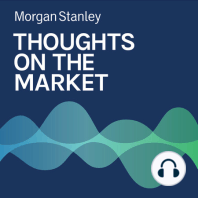4 min listen

2024 US Elections: Inflation’s Possible Paths
2024 US Elections: Inflation’s Possible Paths
ratings:
Length:
11 minutes
Released:
Apr 10, 2024
Format:
Podcast episode
Description
Our Global Chief Economist joins our Head of Fixed Income Research to review the most recent Consumer Price Index data, and they lay out potential outcomes in the upcoming U.S. elections that could impact the course of inflation’s trajectory. ----- Transcript -----Michael Zezas: Welcome to Thoughts on the Market. I'm Michael Zezas, Morgan Stanley's Global Head of Fixed Income and Thematic Research.Seth Carpenter: And I'm Seth Carpenter, Global Chief Economist.Michael Zezas: And on this special episode of Thoughts on the Market, we'll be taking a look at how the 2024 elections could impact the outlook for inflation.It's Wednesday, April 10th at 4pm in New York.Seth, earlier this morning, the US Bureau of Labor Statistics released the Consumer Price Index (CPI) data for March, and it's probably an understatement to say it's been a much-anticipated report -- because it gives us some signal into both the pace of inflation and any potential fed rate cut path for 2024. I want to get into the longer-term picture around what the upcoming US election could mean for inflation. But first, I'd love your immediate take on this morning's data.Seth Carpenter: Absolutely, Mike. This morning's CPI data were absolutely critical. You are right. Much anticipated by markets. Everyone looking for a read through from those data to what it means for the Fed. I think there's no two ways about it. The market saw the stronger than expected inflation data as reducing the likelihood that the Fed would start cutting rates in June.June was our baseline for when the Fed would start cutting rates. And I think we are going to have to sharpen our pencils and ask just how much is this going to make the Fed want to wait? I think over time, however, we still see inflation drifting down over the course of this year and into next year, and so we still think the Fed will get a few rate hikes in.But you wanted to talk longer term, you wanted to talk about elections. And when I think about how elections could affect inflation, it's usually through fiscal policy. Through choices by the President and the Congress to raise taxes or lower taxes, and by choices by the Congress and the President to increase or decrease spending.So, when you think about this upcoming election, what are the main scenarios that you see for fiscal policy and an expansion, perhaps, of the deficit?Michael Zezas: Yeah, I think it's important to understand first that the type of election outcome that historically has catalyzed a deficit expansion is one where one party gets complete control of both the White House and both chambers of Congress.In 2025, what we think this would manifest in if the Democrats had won, is kind of a mix of tax extensions, as well as some spending items that they weren't able to complete during Biden's first term -- probably somewhat offset by some tax increases. On net, we think that would be incremental about $500 billion over 10 years, or maybe $40 [billion] to $50 billion in the first year.If Republicans are in a position of control, then we think you're looking at an extension of most of the expiring corporate tax cuts -- expire at the end of 2025 -- that is up to somewhere around a trillion dollars spread over 10 years, or maybe a hundred to $150 billion in the first year.Seth Carpenter: So, what I'm hearing you say is a wide range of possible outcomes, because you didn't even touch on what might happen if you've got a split government, so even smaller fiscal expansion.So, when I take that range from a truly modest expansion, if at all, with a split government, to a slight expansion from the Democrats, a slightly bigger one from a Republican sweep, I'm hearing numbers that clearly directionally should lead to some inflationary pressures -- but I'm not really sure they're big enough to really start to move the needle in terms of inflationary outcomes.And I guess the other part that we have to keep in mind is the election’s happening in November of this year. The new
Released:
Apr 10, 2024
Format:
Podcast episode
Titles in the series (100)
Andrew Sheets: Fed to the Rescue? Maybe Not. by Thoughts on the Market